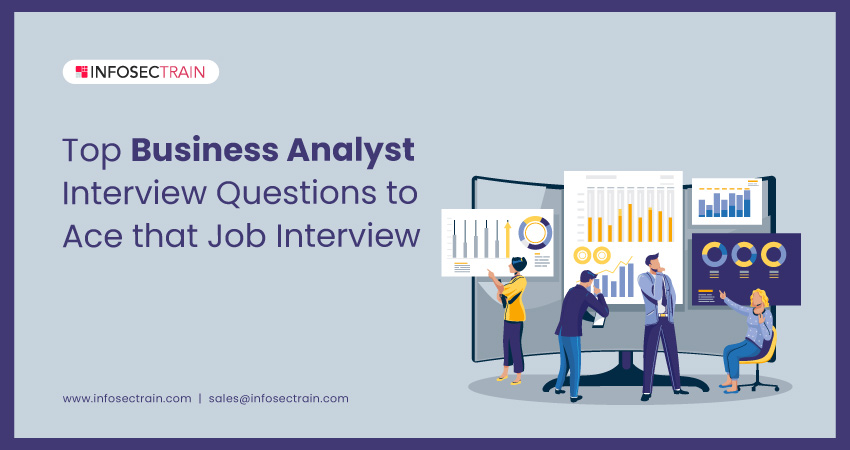Top Business Analyst Interview Questions To Ace That Job Interview
Business analyst jobs are among the most lucrative job profiles and offer high remuneration. A business analyst must employ various technical skills and undertake project management and quality testing. Being fully prepared for popular business analyst interview questions is essential if you aspire to be a business analyst.

Due to high competition and multiple candidates with similar skills and experience, preparing for the interview and answering all the questions efficiently to prove your expertise to the employer is essential. Thorough interview preparation will help the candidates represent themselves better and give proper justifications for their knowledge to the desired company.
It is vital to stage interview questions to embark on a new role in the Business Analyst Career. So read on and help yourself with some of the most commonly asked questions during business analyst job interviews:
IN THIS BLOG:
- Basic Business Analyst Interview Questions (Entry level)
- Most popular Business Analyst interview questions
- Key takeaways
BASIC BUSINESS ANALYST INTERVIEW QUESTIONS (ENTRY-LEVEL)
1. What is the role of a Business Analyst in an organization?
The best way to define the role of a Business Analyst is that it is a bridge that works between different stakeholders in an organization. A business analyst helps organizations improve their operations by studying their business model and identifying areas for improvement.
2. What makes you feel you fit our company’s Business Analyst role?
I’m an analytical thinker with a passion for identifying areas for improvement and developing creative solutions. I have experience working with cross-functional teams and have a strong understanding of business processes and technologies.
3. According to you, what are a Business Analyst’s core competencies?
A business analyst must have exceptional negotiation and communication skills. There are other vital attributes that a business analyst must possess, such as analytical thinking, problem-solving, and decision-making. A business analyst should have adequate industry knowledge, business process management skills, and technical proficiency.
4. What is a Use Case? What steps must you follow to design Use Cases?
A use case is a methodology primarily used in system analysis that describes how a user uses a system to accomplish a specific goal. The use case can be defined as a set of possible interactions between users and systems in a particular environment and related to a specific goal.
5. Are you aware of the different techniques like Moscow and SWOT?
The term MoSCoW stands for Must or Should, Could or Would, each denoting a prioritization category. A business analyst should implement MoScow by analyzing an organization’s demand and comparing it with other needs to prioritize the framework requirements.
Additionally, SWOT or Strengths, Weaknesses, Opportunities, and Threats Analysis is an organization’s most frequently used technique for proper resource allotment. A business analyst should be able to properly recognize the weaknesses and strengths of any corporate framework to translate them into opportunities and threats effectively.
6. What are the skills that a business analyst must possess?
There are numerous skills that a Business Analyst must possess, but some of them that I can recall right now are:
- Analytical thinking and problem-solving
- Business process management
- Industry and business knowledge
- Decision-making and negotiation skills
- Technical and soft skills
MOST POPULAR BUSINESS ANALYST INTERVIEW QUESTIONS
1. Do you think a Business Analyst should be involved in testing?
There is no specified answer to this question since business analysts’ involvement in testing varies depending on the specific project and organization. However, a Business Analyst must be involved in testing because they might better understand the overall system requirements and associated challenges. Therefore, it makes them instrumental during the testing phase to run it appropriately and resolve any system-related query.
2. Differentiate between risk mitigation and risk avoidance.
| RISK MITIGATION | RISK AVOIDANCE |
| Risk mitigation is what needs to be done when a risk occurs. | Risk avoidance is what needs to be done to avoid the risk. |
| It results in a lower probability of risk occurrence. | It terminates any probability of risk by eliminating the cause. |
| It verifies whether any impact has occurred for the project/business due to risk occurrence. | It results in the effect of the threat occurrence being reduced to 0% |
| Organizations need to bear high costs in case of any risk. | Cost is eliminated in risk avoidance. |
3. Explain the Business Analysis process flow.
Here’s the Business Analysis process flow:
- Information gathering
- Identify the key stakeholders
- Identify the business objective
- Determine the available options
- Scope the definition
- Define the delivery plan
- Define the requirements of the project
- Implementation and evaluation
4. What are the benefits of Business Process Modelling?
Some key benefits of Business Process Modelling are:
- It aligns operations with business objectives
- It enables the documentation and communication of an organization’s business processes.
- It improves operational efficiency
- It increases control and consistency
- It helps organizations gain a competitive advantage
5. What is BRD? How is it different from SRS?
BRD, which stands for Business Requirement Document, is a formal contract between the client and the organization to develop a specific product. Some differences between BRD and SRS are:
| BRD (Business Requirement Document) | SRS (Software Requirement Specifications) |
| It contains high-level business requirements and stakeholder requirements. | Click on a link or download files from someone you do not know or who seems suspicious |
| Business analysts create BRD after their direct interaction with the clients | SRS is designed based on technical expertise and needs. |
| It is used by upper and middle management. | Project managers, SMEs, and technical and implementation lead use it. |
6. What is the difference between business analysis and business analytics?
The key difference in comparing business analytics and business analysis is that the first is data-related, whereas the second is functions and process-related.
Additionally,
Business Analysis helps recognize the business needs and determine the solutions to problems.
Business Analytics helps handle and analyze data to get insights into a business.
7. What is Benchmarking?
Benchmarking can be defined as the process of comparing a company’s or an individual’s performance against others in the same industry. This can be done regarding specific profitability, productivity, or customer satisfaction metrics. Benchmarking mainly aims to identify areas where a company can improve its performance. By understanding how others in the industry operate, a business can develop strategies to compete better. Benchmarking can also be helpful to companies for keeping track of their own performance over time and ensuring that they are making progress toward their goals.
8. What is process design?
Process design means creating a process to achieve particular objectives. Process design workflows are created to achieve great outcomes in the shortest time possible. It also includes the process flow diagrams, determination of desired output levels, and other process characteristics.
9. Explain the requirement elicitation strategy.
Requirement elicitation is the process of collecting all the requirements related to a system from the end users, stakeholders, and customers. As per the BABOK guide, there are nine methods that can be used as part of the requirement elicitation process, and these are:
- Brainstorming
- Interviews
- Observation
- Document Analysis
- Focus Groups
- Requirements Workshops
- Interface Analysis
- Survey or Questionnaire
- Prototyping
KEY TAKEAWAYS
Along with formalizing yourself with a proper Business Analyst interview Q&A preparation, it is also essential to keep certain things in mind before appearing for the interview. Since the role of a Business Analyst is crucial in an organization, the interviewer’s expectations would be high, so it is important to:
- Be familiar with the important terms and techniques.
- Brush up your basic knowledge of and be ready with examples.
- Be confident while narrating your experience or explaining any documentation.
- Patiently listen and understand the question and provide relevant information.
- Highlight and focus on your strengths to establish effectiveness.
Additionally, holding Business Analysis Certification increases your credibility and makes hiring easier.






 1800-843-7890 (India)
1800-843-7890 (India)